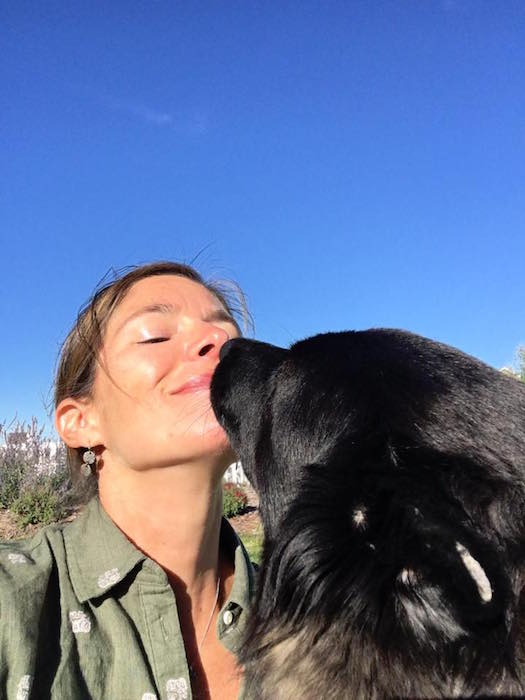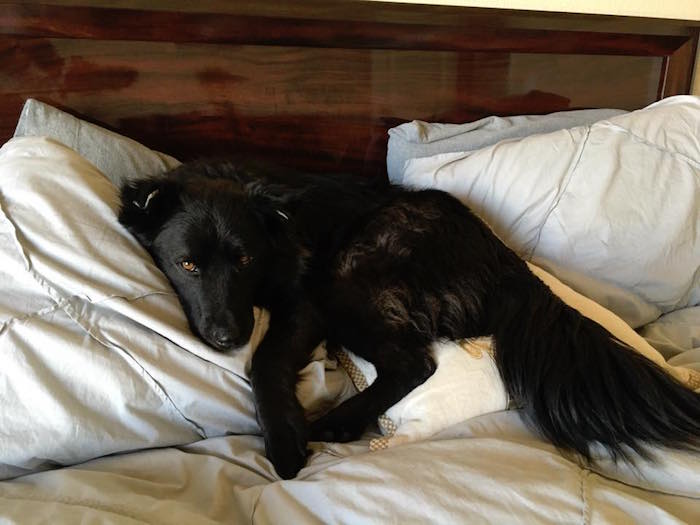
Six weeks ago, my cat died.
I adopted her at 10 weeks old.
I was still a single gal. She lived with me in eight different houses, accepted me meeting a boyfriend, marrying a husband, giving birth to two kids and adopting a middle-aged dog. She witnessed the brightest of the light and the deepest of the dark days of well over one-third of my life.
She moved from this life only days after I found out she had advanced alimentary cancer. I made the impossible decision to have her euthanized when, with our veterinarian, we determined her quality of life had diminished beyond comfort.
As I grieve and begin to make sense of this immeasurable loss, I am reminded of the importance of our connection to animals.
The beloved animals in our lives (and even those we never get to know but maybe admire from afar, in their wildness and unpredictability) are not our soulmates. Us and them aren’t “made” for each other. They aren’t representations of what we’d be if we were a species other than Homo sapiens.
And, they are not our children.
I am both a mother and a companion to a pet. Even if I didn’t have kids, I wouldn’t think of my dog as my kid. As a mother, I nurture and support my children in their growth and development. I don’t do that for my dog. She doesn’t need me to. Yes, she wants and, perhaps, needs my love and affection.
Theoretically, I could teach her fun party tricks, but what good is that?
She has much more to teach me than tricks—and it’s my privilege to allow her to show me.
We are drawn to pets for rich and complicated reasons. We welcome them into our lives based on something interminably greater than our over-simplified definition of love for “pets” that manifests in designer dog beds, raw diets painstakingly prepared in our human kitchens, professional photos taken on the lap of Santa Claus or getting blessed on behalf of Saint Frances of Assisi. Indeed it is much more significant than that. We seek them because we can love them safely. We can devote ourselves to them in a way and to a degree that we have often been taught is dangerous to devote to another human and narcissist to commit to ourselves.
We believe they love us back unconditionally and infinitely. I believe that, too.
Still, our relationships with our pets are so much more valuable than that love. These relationships may be critical to our humanity and the success of a peaceful, kind, and compassionate society. And this is why:
Our pets reflect back to us our true nature—that bright, stark place from which we originate, what makes us human and, at the same time, individuals. They show us our softness, our vulnerability, our humanity. They hold space for us to shed the armor of unresolved anger, fear, grief and suffering so that we can shine brightly and beautifully in our imperfections. We tell our friends funny stories about the goofy thing our cat did last night, and we share pictures of our dogs on Facebook and Instagram (with hashtags so everyone can find them). But while these stories and pictures star our pets, they really tell about us. They show who we are, what we value in life, how significant we really are. Our pets’ big, brown (or yellow or blue) eyes are the windows to our souls. We see in them what is in us but are reluctant to appreciate, for fear of being vain, or show to others, for fear of being rejected.
Thirteen years with my cat allowed me to understand, accept and value qualities that I once thought were my cat’s—quiet, contemplative, strong-willed, confident—but later came to realize are mine, too. She reflected my true nature back to me and gave weight and importance to these traits. She encouraged me to discover and treasure them in myself and to put them out into the world. Our pets and admired animals are beautiful and authentic, and they show us that we can and maybe should be, too.
If we lived what our pets show us, if we lived our lives from the same place that our pets live from, if we viewed the qualities of other people in the ways in which we view the qualities of our pets, how would our interactions with ourselves, those around us and our world be different? Could we approach accidents and fearful behavior in humans with the compassion and understanding and forgiveness we show our pets when they slip up?
I wrote the following poem for my dog, Tuli (pictured here), when I was thinking and writing about Dharma recently. When I read the poem now, I realize that this love song to my canine pal is really a discovery of what she is and what I am, the possibility of me living as myself and the ease and comfort that might bring to those around me.
Tuli,
What is your purpose, dear friend?
Do you have a Dharma?
Your true nature runs deep, as complicated and profound as anyone else’s, I’m sure of it.
But not obscured, not veiled.
You never stifle it. You don’t know how. And you refuse to.
It sits on the surface of your being; it washes over me when I look into your brown eyes.
It courses through your every fiber when you run, roll, speak, sleep.
And when I ask you to change, to obey, to conform to my “right” and to my “wrong,” you do.
Sometimes. And that is your true nature, too.
You give weight to your essence, always.
And just as I did not ask to be here, you did not ask to be here.
Although many of your brethren were made by my brethren, carefully bred and coaxed into being,
For the gain of others,
You were not, my steady mutt. Your perfection is in your randomness,
Like mine.
In this lifetime, you have lived a thousand lives, reinvented by others at each stop,
But remaining unchanged to yourself and in yourself. Is this your path
to your Dharma?
Do you know your true nature or do you simply live by it?
Do you know your Dharma? Are you living it?
Yes, my darling; you are right. Let’s do curl up together and stare into the flames.
We are where we are to be.
Is this our shared Dharma in this moment?

Author: Jill Lovato
Images: Author’s own
Editor: Renée Picard








Read 0 comments and reply